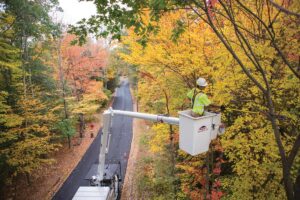When Indiana teenagers Lee Whittaker and Ashley Taylor saw an electric co-op-sponsored power line safety demonstration at their high school, they never expected to actually put their new knowledge to the test. But less than a week later, the two experienced a close call with a downed power line.
“I could have lost my life that night,” recalls Taylor. “My plans after high school—all of that was just running through my mind.”
The duo, along with two other classmates, was in a car that fishtailed into a utility pole, bringing live wires to the ground. The car rolled on its side and was pinned down by the fallen pole.
With the White County Rural Electric Membership Corporation-sponsored safety demonstration fresh on his mind, Whittaker resisted the urge to get out of the vehicle.
“I made sure everybody else was okay, made sure I was okay and told everyone not to get out,” he notes. “That was the main point and was repeated several times: not to get out of the vehicle in an accident involving power lines.”
When the mother and little sister of another teen in the car arrived on the scene, Whittaker and those inside yelled out for them to keep away. All told, the quartet stayed in the car for 45 minutes until receiving an all-clear from the utility line crew that arrived to help.
Stories like Whittaker’s and Taylor’s—with happy endings—aren’t often publicized. But electric cooperatives nationwide are striving to make that outcome the norm. Safety on both sides of the power line remains priority one for co-ops, reflected through public safety programs and on-the-job training for co-op employees.
Living and breathing safety
Since electric co-op line crews work with energized lines day in and day out, safety training becomes an ongoing ritual.
“When you have folks across Illinois working around high-voltage electricity every day, safety is not an option,” says Matt Eisenmenger, Association of Illinois Electric Cooperatives safety instructor. “Safety is something we live and breathe.”
Being an electrical line worker ranks as one of the top 10 most dangerous professions, according to the U.S. Bureau of Labor Statistics. Ken Brubaker, Manager of Safety Programs, at the Arlington, Va.-based National Rural Electric Cooperative Association (NRECA), hopes to one day get line workers off the list.
“When you get in the top five, which includes fishermen and loggers, it seems you get a Discovery Channel or History Channel show about the hazards—not a good thing,” he quips. “The best way to overcome these statistics involves fostering a culture of safety within each co-op.”
When an electrical accident happens, generally a series of safety rules have been violated. While a system of redundant safety procedures has been developed for every task a lineworker may take on, the practices are only effective if employees take them seriously and hold each other accountable.
“We’re trying to encourage a kind of repetitive safety coaching among line superintendents as well as supervisors at all levels,” says Brubaker. “Take your favorite football team: there’s a lot of coaching and play practicing going on behind the scenes before players hit the field for a game. If it weren’t for that coaching, there would be a lot more quarterback sacks and fumbled footballs. When co-op supervisors take the time to ‘coach’ their employees and bolster safety awareness, accident rates go down. Supervisor safety coaching and employees practicing their safety procedures should make zero injuries an attainable goal each year.”
An ounce of prevention
Being safe boils down to being aware of potential pitfalls. Taking the time to learn about them can be a lifesaver, as Lee Whittaker and Ashley Taylor discovered.
“I feel like I’m the luckiest person living,” concludes a tearful Taylor. “The crash happened so quickly after we’d learned about it. We actually got to use that information to save each other’s lives. Yeah, we’re really lucky.”
Scott Gates writes on consumer and cooperative affairs for the National Rural Electric Cooperative Association, the Arlington, Va.-based service arm of the nation’s 900-plus consumer-owned, not-for-profit electric cooperatives.









